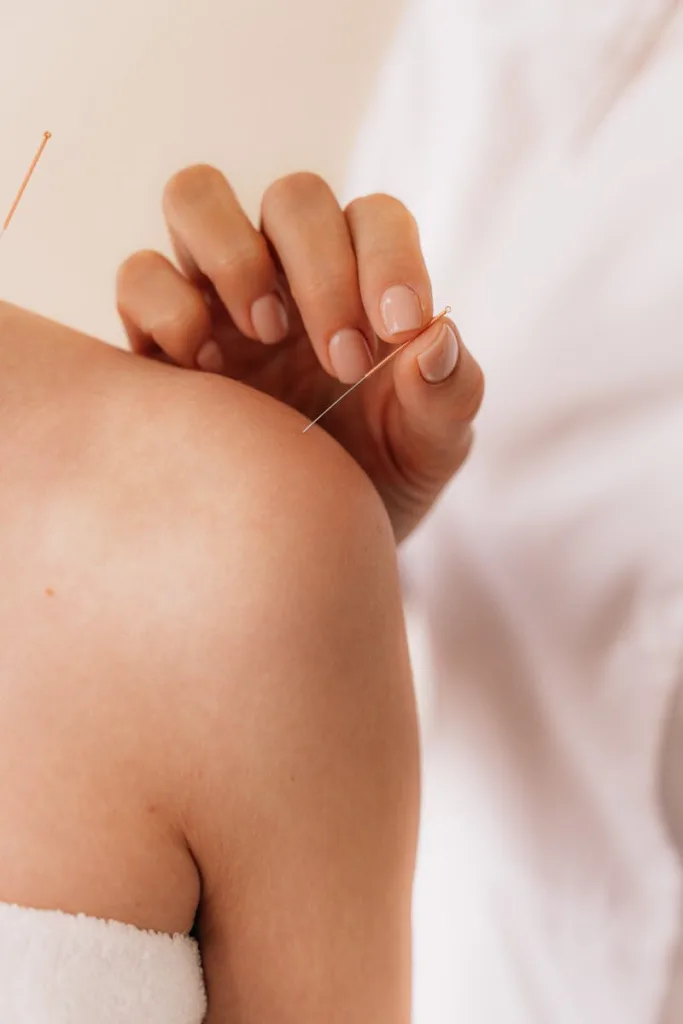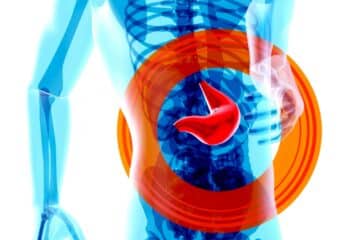Understanding Rotator Cuff Injuries: Exploring Natural Healing and the Role of Acupuncture
This is going to be a more in-depth look at rotator cuff injuries. For a shorter overview of how acupuncture can help with rotator cuff issues, feel free to give us a call and talk to one of our specialists today.
Rotator cuff injuries represent a significant source of shoulder pain and functional limitation for a large number of individuals.1 These injuries, ranging from mild tendinitis to complete tears, can significantly impact daily activities and quality of life.4 While conventional medical approaches often involve a spectrum of treatments from conservative measures like rest and physical therapy to surgical intervention, many individuals seek to understand the body’s innate capacity to heal and explore alternative or complementary therapies.1 This post aims to delve into the potential for rotator cuff injuries to heal without medical intervention, examining the current research landscape. Furthermore, it will explore the evidence surrounding the effectiveness of acupuncture as a therapeutic modality for these common injuries.
The shoulder joint, a marvel of biomechanical engineering, owes much of its stability and wide range of motion to the rotator cuff.1This intricate structure is composed of four muscles – the supraspinatus, infraspinatus, teres minor, and subscapularis – and their respective tendons that encircle the head of the humerus, connecting it to the shoulder blade.1 These muscles work in coordination to facilitate crucial movements like lifting and rotating the arm, while also ensuring the humeral head remains securely within the glenoid socket.1 Injuries to the rotator cuff frequently involve the supraspinatus tendon, often occurring near its insertion point on the humerus4

Photo by Scott Webb on Pexels
Understanding whether a rotator cuff injury can heal naturally requires examining the findings of studies that have followed patients over time without surgical intervention.13 These longitudinal studies provide valuable insights into the natural progression of these injuries. A significant observation from this body of work is that degenerative rotator cuff disease, often associated with aging, frequently involves a gradual worsening.13 Research indicates that many individuals with rotator cuff tears, whether initially experiencing pain or not, tend to exhibit a slow increase in the size of the tear and a decline in the quality of the surrounding muscles over time.13 Notably, full-thickness tears appear to be at a higher risk of enlargement compared to partial-thickness tears.13 In fact, approximately half of all degenerative rotator cuff tears may progress in size within a five-year period.13 This suggests that relying solely on the body’s inherent healing mechanisms might not be sufficient to address significant rotator cuff damage.
While the prospect of complete healing without intervention might be appealing, the majority of evidence suggests that complete rotator cuff tears typically do not mend on their own.1 Several sources emphasize that when a rotator cuff muscle tears away from the bone, surgical repair is often necessary to restore proper shoulder function.1 However, the situation is more nuanced for partial tears. Some minor or incomplete tears may indeed experience a degree of healing or improvement through non-surgical means.2 It is important to note that even when a partial tear seems to heal, the process might involve the formation of fibrocartilage, which results in a weaker connection between the tendon and the bone compared to the original tissue.18 Furthermore, a study that tracked the natural evolution of rotator cuff lesions found no instance of the lesion size reducing, reinforcing the idea that spontaneous healing is unlikely.21 Another study monitoring asymptomatic rotator cuff tears over nearly three years found that none of the tears healed; instead, a significant portion increased in size, and over half of the participants began to experience shoulder pain.15 Despite these findings, acupuncture treatment has shown to yield satisfactory outcomes in many cases of partial tears, particularly those affecting less than half the tendon’s thickness, as well as in some chronic full-thickness tears in older individuals.16
Several factors play a crucial role in determining the likelihood of a rotator cuff injury healing naturally. The size of the tear is a primary determinant, with smaller, partial tears having a greater potential for healing compared to larger, full-thickness tears.17 Tears exceeding 2 cm in size may exhibit lower rates of healing21, and massive tears, defined as larger than 5 cm and often involving multiple tendons, are particularly unlikely to heal spontaneously.21 The age of the patient also influences healing capabilities. Younger individuals generally possess more robust healing mechanisms 17, although even older adults might experience some level of healing, especially with smaller tears.17 However, studies on surgical repair indicate that increasing age is associated with lower healing rates 23, suggesting a similar trend in natural healing potential. Activity level is another important consideration. While resting the affected shoulder and modifying activities that cause pain are generally advised5, complete immobilization may not always be necessary or beneficial. Some research suggests that the overall activity level of the shoulder might not directly correlate with the risk of tear progression.27 Nevertheless, avoiding activities that aggravate the injury is essential to facilitate any potential healing.5 Other local factors such as the quality of the muscle (presence of atrophy or fatty degeneration), the integrity of the tendon tissue itself, and the presence of delamination within the tendon can also impact healing.21 Additionally, the limited blood supply to tendons in general can hinder the recovery process.5 Systemic factors like smoking, diabetes mellitus, and hypercholesterolemia have also been shown to negatively affect tendon healing.22
| Factor | Influence on Healing/Outcome | Snippet IDs |
| Tear Size | Smaller, partial tears have a better chance; larger, full-thickness and massive tears are less likely to heal naturally. | 17 |
| Patient Age | Younger individuals generally have better healing capabilities, but healing potential may decrease with age. | 17 |
| Activity Level | Rest and activity modification are important; avoiding exacerbating activities is crucial. | 5 |
| Muscle Quality | Atrophy and fatty degeneration negatively impact healing potential. | 21 |
| Tendon Quality | Degenerated tendon tissue has a reduced capacity to heal. | 21 |
| Blood Supply | Poor blood supply to tendons limits their ability to heal effectively. | 5 |
| Smoking | Negatively influences tendon healing. | 22 |
| Diabetes | Negatively influences tendon healing. | 22 |
| Hypercholesterolemia | Negatively influences tendon healing. | 23 |
| Delamination | The presence of delamination (separation) within the tendon can complicate healing. | 21 |
While complete natural healing, without any intervention, of significant rotator cuff tears might be improbable, conservative management, particularly through acupuncture, has shown promise in helping the body heal.
Acupuncture, is a therapeutic modality rooted in traditional Chinese medicine, and has gained increasing recognition as a potential complementary treatment for various pain conditions, including shoulder pain.37 Traditional acupuncture operates on the principle of restoring the balance and flow of Qi, or vital energy, through specific pathways in the body known as meridians.38 From a Western medical perspective, acupuncture is believed to work by stimulating the nervous system, which in turn can trigger the release of endorphins, the body’s natural pain relievers, and help to reduce inflammation.38 Given its potential analgesic and anti-inflammatory effects, acupuncture is being explored as a non-pharmacological approach to managing the pain associated with rotator cuff injuries.37
Research into the effectiveness of acupuncture for rotator cuff injuries has yielded promising, though sometimes mixed, results. Several studies suggest that acupuncture, either used alone or in combination with physical therapy, can be more effective than other interventions in providing short-term improvement in shoulder joint function and pain reduction.41 For instance, one study reported that acupuncture led to a more significant decrease in both pain and disability compared to the non-steroidal anti-inflammatory drug meloxicam.48 When comparing acupuncture to placebo treatments, some studies have shown similar short-term benefits in terms of pain and function.37 However, other research indicates that acupuncture involving skin penetration is more effective than placebo needling in alleviating pain for athletes suffering from rotator cuff tendinitis.50 A Cochrane review, while noting a lack of definitive evidence overall, suggests that acupuncture might offer short-term relief from pain and improved shoulder function.37
Systematic reviews and meta-analyses, which pool data from multiple studies, provide a higher level of evidence. Several such analyses have concluded that acupuncture, whether administered alone or alongside physical therapy, is indeed efficacious for short- to medium-term pain relief and functional improvements in individuals with rotator cuff diseases.41 One systematic review specifically suggests that acupuncture is effective in reducing pain and improving functional recovery in patients following rotator cuff repair surgery.51 Furthermore, there are ongoing efforts to rigorously evaluate the role of acupuncture in managing symptomatic rotator cuff disease, as evidenced by published systematic review protocols.52
The mechanisms through which acupuncture exerts its beneficial effects on shoulder pain are multifaceted. It is believed that acupuncture can modulate both the peripheral and central nervous systems to alter pain perception.41 Additionally, it may influence biochemical and neuroinflammatory processes within the body.41 The insertion of acupuncture needles might also induce mechanical changes in connective tissues, potentially improving local blood circulation.41 A key aspect of acupuncture’s pain-relieving action is its potential to stimulate the release of endorphins, the body’s natural painkillers, and to enhance blood flow to the injured area, thereby reducing inflammation and promoting the healing of tissues.38 Acupuncture can also help to relax tense muscles surrounding the shoulder joint, which can contribute to pain and limit the range of motion.38 Moreover, research suggests that acupuncture may inhibit the transmission of pain signals and exert both anti-nociceptive (pain-blocking) and anti-inflammatory effects.47 At a molecular level, studies have indicated the involvement of substances like adenosine triphosphate (ATP) and specific ion channels at the acupuncture points, as well as the modulation of neurotransmitters such as opioids, serotonin, and norepinephrine within the central nervous system, all contributing to the analgesic effects.40

Photo by Antoni Shkraba Studio on Pexels
Acupuncture can be effectively integrated into a comprehensive treatment plan for rotator cuff injuries, often complementing other conservative approaches such as physical therapy, rest, and modification of activities.28 Some studies suggest that combining acupuncture with exercise might yield better outcomes in terms of pain reduction, improved range of motion, and enhanced function compared to exercise alone.37 It is crucial to emphasize that the most effective treatment strategy should be tailored to the individual’s specific needs, considering the nature and severity of their injury. Consulting with healthcare professionals is essential to develop a personalized plan that may include acupuncture as a part of a holistic approach to recovery.
In conclusion, while the body possesses an inherent capacity for healing, complete and spontaneous resolution of significant rotator cuff tears is generally unlikely. However, minor partial tears may experience some degree of improvement. Conservative management, particularly acupuncture, plays a vital role in managing symptoms and improving function. Acupuncture emerges as a promising complementary therapy, with evidence suggesting its potential to alleviate pain and enhance shoulder function in the short to medium term. The mechanisms of action likely involve a complex interplay of neurological, biochemical, and physiological effects. The selection of specific acupuncture points can target different aspects of shoulder pain and dysfunction. Ultimately, individuals with rotator cuff injuries should consult with acupuncture professionals to receive an accurate diagnosis and discuss all available treatment options, including the potential benefits of acupuncture as part of a comprehensive and personalized recovery plan.
We would recommend reaching out to us at Acupuncture and Holistic Health Associates if you have any questions and we would love to answer them.
Works cited
- Can My Rotator Cuff Tear Heal on Its Own? – Dr. Matthew Pifer, accessed April 23, 2025, https://www.matthewpifermd.com/blog/can-my-rotator-cuff-tear-heal-on-its-own
- Rotator Cuff Tear: Symptoms & Treatment – Cleveland Clinic, accessed April 23, 2025, https://my.clevelandclinic.org/health/diseases/8291-rotator-cuff-tear
- What to know about rotator cuff injuries – UChicago Medicine, accessed April 23, 2025, https://www.uchicagomedicine.org/forefront/orthopaedics-articles/rotator-cuff-injuries
- Rotator Cuff Tear Treatment and Diagnosis – Penn Medicine, accessed April 23, 2025, https://www.pennmedicine.org/for-patients-and-visitors/find-a-program-or-service/orthopaedics/shoulder-pain/rotator-cuff-tear-treatment-and-diagnosis
- Allowing the Body to Mend: Will My Rotator Cuff Injury Heal on Its Own?, accessed April 23, 2025, https://www.floridaboneandjoint.com/blog/2024/allowing-the-body-to-mend-rotator-cuff.html
- Rotator Cuff: Muscles, Tendons, Function & Anatomy – Cleveland Clinic, accessed April 23, 2025, https://my.clevelandclinic.org/health/body/rotator-cuff
- Anatomy, Rotator Cuff – StatPearls – NCBI Bookshelf, accessed April 23, 2025, https://www.ncbi.nlm.nih.gov/books/NBK441844/
- Rotator Cuff Anatomy: Muscles, Function, and Pictures – Healthline, accessed April 23, 2025, https://www.healthline.com/health/bone-health/rotator-cuff-anatomy
- Anatomy, Rotator Cuff – StatPearls – NCBI Bookshelf, accessed April 23, 2025, https://www.ncbi.nlm.nih.gov/sites/books/NBK441844/
- Location and Initiation of Degenerative Rotator Cuff Tears: An Analysis of Three Hundred and Sixty Shoulders – PMC, accessed April 23, 2025, https://pmc.ncbi.nlm.nih.gov/articles/PMC2945926/
- Rotator Cuff Tears: Surgical Treatment Options – OrthoInfo – AAOS, accessed April 23, 2025, https://orthoinfo.aaos.org/en/treatment/rotator-cuff-tears-surgical-treatment-options/
- Rotator cuff tear | Radiology Reference Article | Radiopaedia.org, accessed April 23, 2025, https://radiopaedia.org/articles/rotator-cuff-tear
- Natural History of Rotator Cuff Disease and Implications on Management – PMC, accessed April 23, 2025, https://pmc.ncbi.nlm.nih.gov/articles/PMC4695395/
- Does surgical intervention alter the natural history of degenerative …, accessed April 23, 2025, https://pubmed.ncbi.nlm.nih.gov/39089418/
- Do Rotator Cuff Tears Heal Themselves? – Client First Wireframe 5, accessed April 23, 2025, https://www.oregonshoulder.com/blog-posts/do-rotator-cuff-tears-heal-themselves
- Current trends in rehabilitation of rotator cuff injuries | SICOT-J, accessed April 23, 2025, https://www.sicot-j.org/articles/sicotj/full_html/2023/01/sicotj230032/sicotj230032.html
- Rotator Cuff Tears: Will They Heal on Their Own? – Peak Spine & Sports Medicine, accessed April 23, 2025, https://www.peakspinesports.com/blog/rotator-cuff-tears-will-they-heal-on-their-own
- Partial Thickness Rotator Cuffs Tears – What are My Options Now? | First State Orthopaedics in Delaware, accessed April 23, 2025, https://www.firststateortho.com/blog/partial-thickness-rotator-cuff-tears-options
- Partial Rotator Cuff Tear | Johns Hopkins Medicine, accessed April 23, 2025, https://www.hopkinsmedicine.org/health/conditions-and-diseases/partial-rotator-cuff-tear
- How Long Does it Take a Torn Rotator Cuff to Heal Without Surgery – TSAOG, accessed April 23, 2025, https://www.tsaog.com/blog/2023/10/31/how-long-does-it-take-for-a-torn-rotator-cuff-to-heal-with-no-surgery/
- Rotator Cuff Healing – SciELO, accessed April 23, 2025, https://www.scielo.br/j/rbort/a/TysWmCqXSzpKnTPfdr5sKVv/
- Factors Influencing the Reparability and Healing Rates of Rotator Cuff Tears – Orthobullets, accessed April 23, 2025, https://upload.orthobullets.com/journalclub/pubmed_central/32681307.pdf
- Factors affecting healing after arthroscopic rotator cuff repair – PMC, accessed April 23, 2025, https://pmc.ncbi.nlm.nih.gov/articles/PMC4363803/
- Factors affecting healing after arthroscopic rotator cuff repair – ResearchGate, accessed April 23, 2025, https://www.researchgate.net/publication/273778283_Factors_affecting_healing_after_arthroscopic_rotator_cuff_repair
- Prognostic Factors for Successful Recovery After Arthroscopic Rotator Cuff Repair: A Systematic Literature Review | Journal of Orthopaedic & Sports Physical Therapy, accessed April 23, 2025, https://www.jospt.org/doi/10.2519/jospt.2014.4832
- Rest, Ice, Anti-inflammatory Medication, Physical Therapy – Knowledge Center: Patient information about orthopedic disorders., accessed April 23, 2025, https://www.iskinstitute.com/kc/shoulder/rotator_cuff_tear/t1.html
- Rotator Cuff Tear Rehab, accessed April 23, 2025, https://e3rehab.com/rotator-cuff-tear-rehab/
- Can Physical Therapy Help a Torn Rotator Cuff? – Elite Pain Doctors, accessed April 23, 2025, https://www.elitedoctor.com/blog/can-physical-therapy-help-a-torn-rotator-cuff
- How to Heal a Rotator Cuff Injury Without Surgery | Personalized Orthopedics of the Palm Beaches, accessed April 23, 2025, https://www.popb.md/2024/12/20/how-to-heal-a-rotator-cuff-injury-without-surgery/
- Benefits of Physical Therapy for Rotator Cuff Tear, accessed April 23, 2025, https://mccabebradypt.com/benefits-of-physical-therapy-for-rotator-cuff-tear/
- Do I Need Physical Therapy for a Rotator Cuff Tear? – WebMD, accessed April 23, 2025, https://www.webmd.com/pain-management/physical-therapy-rotator-cuff-tear
- Rotator Cuff Tendinopathy Diagnosis, Nonsurgical Medical … – jospt, accessed April 23, 2025, https://www.jospt.org/doi/pdf/10.2519/jospt.2025.13182
- Rotator Cuff Tendinopathy Diagnosis, Nonsurgical Medical Care, and Rehabilitation: A Clinical Practice Guideline | Journal of Orthopaedic & Sports Physical Therapy, accessed April 23, 2025, https://www.jospt.org/doi/10.2519/jospt.2025.13182
- (PDF) Effectiveness of non-surgical management in rotator cuff calcific tendinopathy (the effect trial): protocol for a randomised clinical trial – ResearchGate, accessed April 23, 2025, https://www.researchgate.net/publication/377179408_Effectiveness_of_non-surgical_management_in_rotator_cuff_calcific_tendinopathy_the_effect_trial_protocol_for_a_randomised_clinical_trial
- Predictors of clinical outcomes after non-operative management of …, accessed April 23, 2025, https://pmc.ncbi.nlm.nih.gov/articles/PMC8082510/
- Effectiveness of Physical Therapy in Treating Atraumatic Full …, accessed April 23, 2025, https://pmc.ncbi.nlm.nih.gov/articles/PMC3748251/
- Acupuncture for shoulder pain | Cochrane, accessed April 23, 2025, https://www.cochrane.org/CD005319/MUSKEL_acupuncture-for-shoulder-pain
- Acupuncture: A Pathway to Relief for Shoulder Pain Sufferers | Multi …, accessed April 23, 2025, https://www.brooklynpaindoctors.com/post/acupuncture-a-pathway-to-relief-for-shoulder-pain-sufferers
- Acupuncture for Shoulder Pain – NYC – Manhattan Physical Therapy, accessed April 23, 2025, https://www.manhattanptandpain.com/post/acupuncture-for-shoulder-pain-nyc
- Understandings of acupuncture application and mechanisms – PMC – PubMed Central, accessed April 23, 2025, https://pmc.ncbi.nlm.nih.gov/articles/PMC8991130/
- e-century.us, accessed April 23, 2025, https://e-century.us/files/ajtr/16/2/ajtr0154306.pdf
- Efficacy comparison between acupuncture and other modalities in the treatment of rotator cuff diseases: meta-analysis of randomized controlled trials – PubMed, accessed April 23, 2025, https://pubmed.ncbi.nlm.nih.gov/38463603/
- Efficacy comparison between acupuncture and other modalities in the treatment of rotator cuff diseases: meta-analysis of randomized controlled trials – PubMed Central, accessed April 23, 2025, https://pmc.ncbi.nlm.nih.gov/articles/PMC10918137/
- Effect of electroacupuncture combined with rehabilitation techniques on shoulder function in patients with rotator cuff injuries – Baishideng Publishing Group, accessed April 23, 2025, https://www.wjgnet.com/2307-8960/full/v12/i21/4582.htm
- Acupuncture Used to Treat Shoulder Injury – YouTube, accessed April 23, 2025, https://www.youtube.com/watch?v=yDw6lVtN0ec
- Effects of Acupuncture Versus Ultrasound in Patients With Impingement Syndrome: Randomized Clinical Trial | Request PDF – ResearchGate, accessed April 23, 2025, https://www.researchgate.net/publication/7821346_Effects_of_Acupuncture_Versus_Ultrasound_in_Patients_With_Impingement_Syndrome_Randomized_Clinical_Trial
- Electroacupuncture combined with rehabilitation techniques for patients with rotator cuff injury – Baishideng Publishing Group, accessed April 23, 2025, https://www.wjgnet.com/2307-8960/full/v13/i17/98692.htm
- (PDF) Effectiveness of Acupuncture in Reducing Pain and Improving Shoulder Function in Patients with Rotator Cuff Tendinopathy: A Clinical Trial Study – ResearchGate, accessed April 23, 2025, https://www.researchgate.net/publication/361315365_Effectiveness_of_Acupuncture_in_Reducing_Pain_and_Improving_Shoulder_Function_in_Patients_with_Rotator_Cuff_Tendinopathy_A_Clinical_Trial_Study
- Effects of acupuncture and placebo TENS in addition to exercise in treatment of rotator cuff tendinitis – ResearchGate, accessed April 23, 2025, https://www.researchgate.net/publication/8120023_Effects_of_acupuncture_and_placebo_TENS_in_addition_to_exercise_in_treatment_of_rotator_cuff_tendinitis
- Randomised clinical trial comparing the effects of acupuncture and a newly designed placebo needle in rotator cuff tendinitis – PubMed, accessed April 23, 2025, https://pubmed.ncbi.nlm.nih.gov/10534595/
- Effects of Acupuncture after Rotator Cuff Surgery: A Systematic Review – ResearchGate, accessed April 23, 2025, https://www.researchgate.net/publication/355910146_Effects_of_Acupuncture_after_Rotator_Cuff_Surgery_A_Systematic_Review
- Acupuncture for symptomatic rotator cuff disease: Protocol for a systematic review and meta-analysis – PubMed, accessed April 23, 2025, https://pubmed.ncbi.nlm.nih.gov/31914084/
- Acupuncture and manual therapy for rotator cuff tears: A protocol for systematic review and meta analysis – ResearchGate, accessed April 23, 2025, https://www.researchgate.net/publication/341707108_Acupuncture_and_manual_therapy_for_rotator_cuff_tears_A_protocol_for_systematic_review_and_meta_analysis
- Understanding Shoulder Pain Points: A Guide to Acupuncture …, accessed April 23, 2025, https://www.aiam.edu/acupuncture/acupuncture-shoulder-pain-points/
- Acupuncture For Shoulder Pain | Chiropractor Oakville | Nottinghill, accessed April 23, 2025, https://glenabbeychiro.com/blog/acupuncture-for-shoulder-pain/
- Master Tung’s Points for Shoulder Pain – The Integrative Healing Society, accessed April 23, 2025, https://www.ihsociety.com/mastertungspointsforshoulderpain
- Top 5 Acupuncture Points for Shoulder Pain, accessed April 23, 2025, https://pa-om.com/top-5-acupuncture-points-shoulder-pain/
- Acupressure for Shoulder Pain | My Doctor Online – Kaiser Permanente, accessed April 23, 2025, https://mydoctor.kaiserpermanente.org/ncal/article/acupressure-for-shoulder-pain-1682288
- Acupuncture for Infraspinatus Trigger Points, accessed April 23, 2025, https://www.morningsideacupuncturenyc.com/blog/acupuncture-for-infraspinatus-trigger-points


